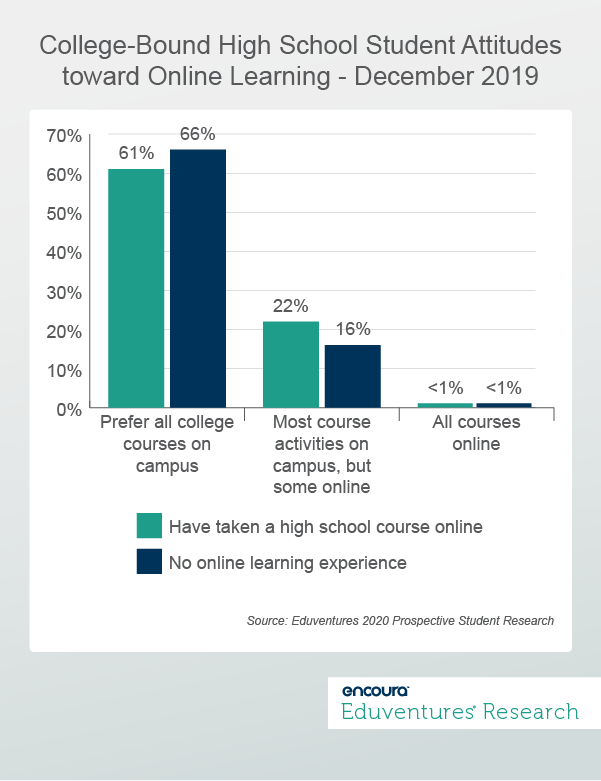A Message from our CEO, Patrick Vogt: It’s been a little more than a month since most Americans starting feeling the impact of COVID-19. In a remarkably short span of time, the vast majority of colleges and universities, prioritizing student and employee safety and instructional continuity, have moved to remote instruction. With the president’s stay-at-home guidelines now extended through at least the end of April, the country is focused on containing the virus. We salute the heroic efforts of our healthcare professionals, and everyone in K-12 and higher education for going above and beyond.
This week’s Wake-Up Call, if and when you have time to read it, reflects on how ready high school students are to embrace online learning. Online learning, historically a domain of adult learners and graduate education, is suddenly ubiquitous across all corners of higher education. There has been much discussion on whether institutions are ready for the changes imposed by social distancing. But what about students?
Or, will they gladly return to on-campus life as soon as possible?The Baseline
In December 2019, well before current events transformed delivery of education across the country, Eduventures conducted our annual Prospective Student Survey™ of college-bound high school students. Among other aspects of college search, this survey assessed attitudes about online learning (Figure 1).

This data shows that prior to the COVID-19 crisis, college-bound high school juniors and seniors far from embraced online education. Less than 1% said they would prefer to take all courses online, and fewer than a quarter selected “most course activities on campus, but some online.” These results have been consistent since 2017, the first year we published the Prospective Student Research Report in Encoura Data Lab™. Over the past decade, the number of traditional-aged college students enrolled at majority online schools has crept up but still represents less than one percent of that population.
The data shown here is segmented by the 36% of juniors and seniors who reported they had taken a high school course online – either fully or partially – and by those with no previous experience with online courses. Segmenting the data in this way shows that a strong majority of those with previous online course experience still prefer on campus courses (61%), but this preference was slightly lower than among those with no exposure to online learning at all (66%).
Additionally, although the overall percentage of students is low, this data also shows that students with online learning experience indicate slightly more interest in “some online” (22%) compared to those with no online course experience (16%).
Overall, this suggests that all traditional-aged undergraduate students view the campus experience as a pivotal aspect of higher education, regardless of their exposure to online learning. Indeed, when asked about the experiences students believe they will learn the most from, the top answers included participation in clubs and activities (56%) and interactions with other students (55%). Both of these experiences can be particularly challenging to imitate in a virtual environment.
But it also suggests that students who experience some type of online learning in high school show greater openness—albeit slight—to “some” level of online course activities in college. Given the sudden increase in the number of students experiencing remote instruction across the country, could this also suggest that demand for “some online course activities” might grow from the current baseline? And, what would “some activities” ideally look like?
The Defining Moment
It’s hard not to speculate about how prolonged school closings, lockdowns, and curfews will affect current middle and high school students—both in how they plan for college and in their outlooks on life. While it is still too early to know for sure, this global crisis could likely be the kind of generational defining moment identified by the research of Executive Fellow of Tammy Erikson Organisational Behaviour at London Business School.
Erikson’s research has found that every generation is profoundly influenced by major events during their formative years – events that help shape adolescent world views. Baby Boomers grew up with a large, competitive peer set and Vietnam War protests. Gen X experienced a troubled economy and the Challenger disaster. Millennials lived through 9/11 and Columbine. And the early members of Gen Z recall the financial crisis of 2008—at time in which the focus on value and return-on-investment of higher education grew.
This will surely be a defining moment for Gen Z, and possibly early members of the next generation (Generation Alpha). It has the potential to re-shape many aspects of our daily life. It’s possible that it could shape at least some of these students’ feelings about incorporating distance learning elements into their student experiences in the future.
The Bottom Line
Right now, the race to distance learning is focused on moving curricula into a digital format as soon as possible to minimize the disruption to academic progress. This is a short-term necessity. In the long term, traditional-aged undergraduate students will likely continue to seek out on-campus experiences, as they always have.
At the same time, no other generation has experienced distance learning at the current scale. If the experience with this format is positive, or if the pandemic proves disruptive for many months or longer, this could lead to greater openness and preparation for digital formats as part of the traditional college experience. These “digital formats” could take many shapes. Students and institutions alike need to take seriously the prospect that distance learning of some description may be fundamental to the higher education experience for the foreseeable future. The more this possibility is thought through and mission-aligned, the better for all involved, not least students.

Never
Miss Your
Wake-Up Call
Learn more about our team of expert research analysts here.
Eduventures Senior Analyst at ACT | NRCCUA
Contact
Thursday, April 23, 2020 at 2PM ET/1PM CT
The CHLOE project — a joint undertaking by Quality Matters and Eduventures — has been taking the pulse of higher education leaders on a national scale since its inception in 2016. While priority for higher ed institutions has now shifted to the safety of students, faculty, and staff amid the uncertainty that surrounds us, the continuity afforded by online learning is precious—however rudimentary arrangements may be on the ground.
Our thanks and admiration go out to the thousands of online leaders, staff, and online learning company employees going above and beyond to stand up remote classes in short order. That so many schools could even consider “going online” in an emergency is testament to how far online has come.
Join us on Thursday, April 23rd at 2pm ET/1pm CT as Eduventures Chief Research Officer Richard Garrett and Quality Matters Executive Director Emeritus Ronald Legon lead our next webinar to discuss the latest findings from the CHLOE 4 report.

